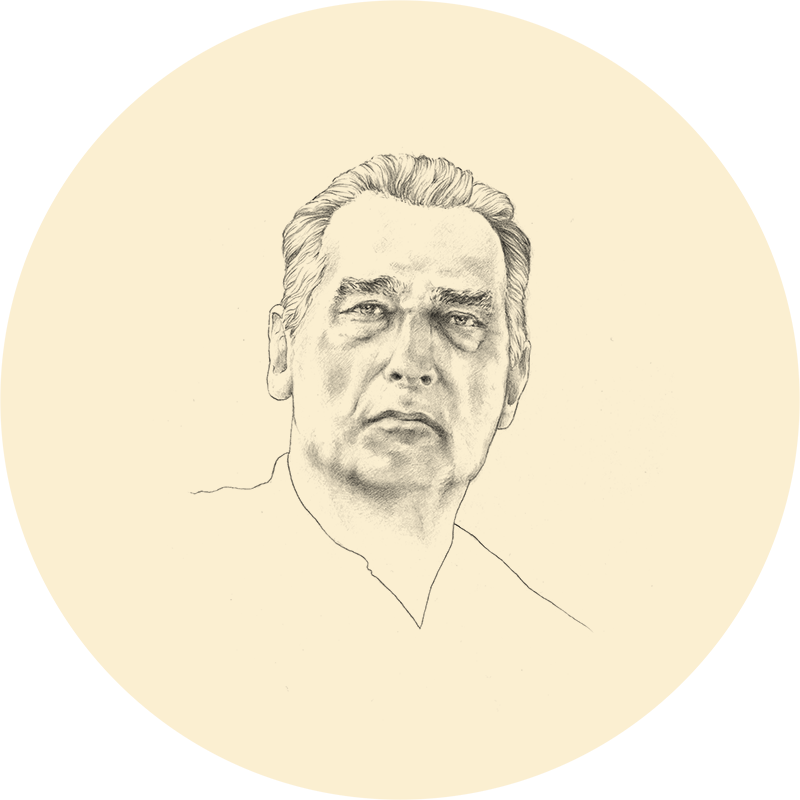Giorgio Marconi, on the other hand, lived on Via Teodosio, which was also close by. You were already a poet, but your paintings were still unknown. He was the first to include you, in 1965, in a group show, together with Mario Schifano, Valerio Adami and Lucio Del Pezzo, at his new gallery; which wasn’t called a gallery – there were too many in Milan, old Sironi had advised him – but a studio, Studio Marconi. On Via Tadino, just past Loreto, ten minutes by bike, for you. Marconi was the son of a framer, he filed away his medical degree and switched from selling frames to selling what was inside them. Very often unknown masterpieces – as when your dear friend Enrico Baj recommended that he purchase the works of a certain Man Ray – that made Marconi the gallerist, par excellence.
You had a degree in letters, but above all you hung around with the artists in Brera. At Bar Giamaica, of course. Many of those callow youths, over the years, became recognized talents. It was enough to be there, where everybody was, drinking glasses of white wine, putting them on your tab in the little booklet of Elio Mainini. Like that time – still in the Fifties – when you were talking with Ugo Mulas, who thought of himself as a poet, as you did, and Pietrino Bianchi passed by, and asked him if he wanted to take some photographs for his weekly magazine. Mulas didn’t even have a camera, he had to borrow one. That is how talents blossomed in Milan. By chance. You just had to be there, swapping ideas, each one believing in the gifts of the next.
They’ve called you a realist, a metaphysical, a surrealist, an Informale. You were just curious to observe the reality beyond reality. You were looking for your total realism, in forms, in words. Umberto Eco, your friend and companion in “Gruppo ’63,” said you were “a writer who paints, a painter who writes.” You were constantly drawing. Even when you were talking. Writing, for you, was a way of relaxing. You went to your chalet in Val Sesia, with the family, and you wrote. Just one month to complete La lunga notte.
It took the infinite patience of Antonia, your lifelong muse and wife, with her ability to organize your creative magma, to manage your volcanic existence, Emilio. You were a cultured man – you “devoured entire strata of European literature,” as Bertelli said – yet you could talk about art and literature with anyone. In newspapers, on television. You never refused. “I don’t know how to say no,” you once confessed to Lina Sotis. “No to the young painter who asks for advice, to the writer who asks for help, to the friend who calls me at the last minute.”
How many “Emilios” were there, Emilio? To each his own. But everyone remembers your multi-pocket trousers. It was as if you wanted to fill them with all the affections that surrounded you. A thought for each, a thoughtful gesture. Even more than writing or painting, maybe what interested you was weaving friendships. Enjoying them sincerely, without ulterior motives or calculations. Quips came easily, like contagious laughter. You never failed to take part in high jinks or horseplay. Like the time you, Alik Cavaliere and other barrel scrapers, at Giamaica, organized an amazing practical joke. It was 1953 and the world’s most famous artist, Pablo Picasso, was coming to the city to personally supervise the hanging of a retrospective of his work. You all admired him, you all wanted to go see Guernica on display at the Sala delle Cariatidi. What you might not have liked was the overwrought worship, that rather provincial bragging and adulation in the air. So it was easy, from one glass of white wine to the next, to come up with a plan that would lay bare the arrogance of the pack, not unlike the attitude derided by the comedian Valter Chiari in the sketch on the “Sarchiapone,” the imaginary animal. You dressed up the janitor of the Brera Academy “as an artist,” disguised as Picasso, and organized a turn-out to celebrate his arrival at the Central Station. You escorted the imposter to the Teatro Filodrammatici, cheered by a thrilled audience. And there were plenty of unwitting dupes: politicians, art dealers, critics…
